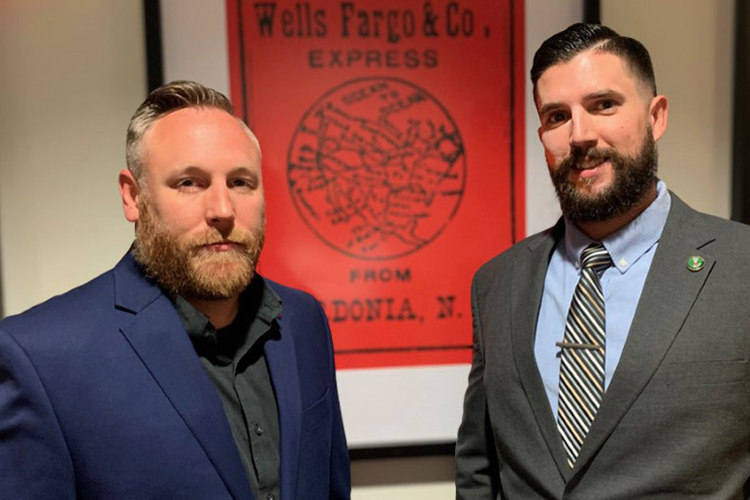It can be difficult for veterans to find work after they leave the military. Whether they’re finding a new career path or adjusting to life as a civilian, finding a new career can be challenging.
Rick McCary, a U.S. Army veteran traded his 13-year career with the U.S. Army for a role in Corporate Risk at Wells Fargo in Chandler. McCary had applied to more than 25 open positions at Wells Fargo, but never got to the interview phase– which changed after he was introduced to John Axtell, a Marine veteran and a Veteran Sourcing Consultant with Wells Fargo who was a member of Wells Fargo’s Military Talent Strategic Sourcing Team.
Throughout his 13 years of service, McCary would visit his wife at work while he was on leave; she worked at Wells Fargo. McCary met his wife’s colleagues and said he loved the culture and people he met. These positive interactions lead McCary to begin pursuing a career with Wells Fargo. After applying to 26 different positions online, McCary didn’t get to the interview process for any of those jobs.
This cycle changed when McCary enrolled in a transition program called Onward 2 Opportunity while he was still active duty. In that program, McCary attended a recruiting event at the U.S. Army Base at Fort Campbell, Kentucky where he met Lisa Young, vice president, military talent recruiting manager with Wells Fargo, and John Axtell’s manager, who spoke about opportunities with Wells Fargo.
“Lisa gave a briefing about the military recruitment side of Wells Fargo and I met and sat with her and she set me up with John Axtell, which was perfect right away because he spoke military and he also spoke civilian,” McCary said, referring to their shared experience as veterans.
“Lisa really enjoyed speaking with Rick, and she emailed me his information and asked if I could reach out to Rick,” Axtell said. “Lisa said she thought he was a great person and that she wanted to connect us so I could work with him. Shortly after I emailed Rick, we set up a phone call to discuss his resume.”
Axtell worked with McCary through the Wells Fargo’s Veteran Recruiter program. The two had several phone calls where Axtell went through McCary’s resume with him to help him tailor his resume to the job description and adjust the language of his resume to more civilian terms and so McCary could understand Wells Fargo’s terminology better to apply to jobs that most suited his skills.
McCary and Axtell worked together to translate McCary’s resume and experience from military centric lingo to civilian terms.
“Think of it as two people speaking different languages,” Axtell said. “We have the military side that speaks a specific language and we have Wells Fargo that speaks a specific language, a civilian and corporate language. So just getting both teams to be able to understand and speak the same language, and Rick was great at that.”
After going through the resume, McCary made the adjustments and applied for a role at Wells Fargo Axtell suggested because it was similar to McCary’s previous experience in the service.
“He coached me through preparing for the interview process and it worked out perfectly,” McCary said.
“We spoke about interviewing and how to answer questions using the S.T.A.R. method to convey his experience and effectiveness in his previous role and the skills he brings,” Axtell said.
After interviewing for the position, McCary received an offer and accepted a role as an Operational Risk Consultant with Wells Fargo in December 2018.
“He did a great job in the interview and shortly after received an offer and now we sit across the hallway from each other in the same building,” Axtell said.
“I went from my position in the service as an Ammunition Logistics Manager, to doing almost the exact same thing at Wells Fargo, and I don’t have to worry about wearing a uniform every day, just business attire.” In his role, McCary identifies different risks that could affect Wells Fargo or not through different third-party service providers.
As a Veteran Sourcing Consultant, Axtell describes his role as working with veterans like McCary to “help them find opportunities at Wells Fargo that we can bring them into as a new career and help drive home our commitment towards our veteran team members.”
Wells Fargo currently has more than 8,400 veteran team members, and more than 4,000 military and veteran team members have been in a role at Wells Fargo for five or more years.
Axtell said what makes Wells Fargo a great place to work for veterans is the programs they’ve built that support veterans. “We’ve built the Veteran Internship program, a military apprenticeship program, and we also have a Veteran Team Member Network where veterans and non-veteran team members come together to provide a support system for each other and volunteer for veteran and non-veteran organizations.
“One of the other biggest pieces for me that I love about it is coming from the military, Rick and I both know it’s a family. Through programs like the Veteran Team Member Network and others you’re a part of a team and there’s camaraderie,” Axtell said. “We don’t call each other employees, we’re team members; and coming from a place that is so driven with teams, to be able to come to another company that is focused on that team mindset and has these programs for veterans, is one of the reasons why I love being here and love coming to work every single day.”
McCary said when leaving the service, there’s uncertainty with your future and how you’re going to provide for your family, but after receiving the offer from Wells Fargo while he was driving from Fort Campbell to Arizona, he could breathe a sigh of relief.
On his first day, McCary was sitting in a temporary desk and upper-level supply chain management employees were sitting next to him, and said they began talking to him immediately and made him feel welcome. “They talked to me like I was one of their own, like we had been buddies for years…they really drove home the family aspect immediately. They treated me like I was equal to them, there was no ‘you’re an employee,’ it’s you’re part of a team and a part of the family,” McCary said.
“It’s a very comforting feeling having that sense of family and having John right across the hall. It’s an amazing feeling leaving such a big organization or family and coming into something like this and having the exact same feeling within a couple hours.”
Axtell and McCary said they hope their stories can inspire and encourage other veterans to consider a career at Wells Fargo.
“A lot of service members, whether we want to admit it or not, we’re afraid of that corporate world,” McCary said. “Because the knowledge of what to do when we leave the service is limited; we have a little help here or there but they really don’t help us translate our experiences, strengths, or our weaknesses, and you have to fend for yourself in a sense and figure it out. And having a veteran recruiting program like John’s team is insane, to know this kind of service is out there for us just to be able to get us where we need to be.”
Axtell said hopefully their stories can be an example to veterans to not be afraid of their military experience. “Even if you feel that you may not be able to portray that information or you see a job that you think may be too daunting to apply for, there are people that care and want to help you and give you an opportunity, programs you can utilize and companies that truly care for you like Wells Fargo with specific programs for veterans.”
Wells Fargo’s veteran support programs include:
• The Veteran Employment Transition (VET) Program: an 8-10 week internship program that provides an opportunity for veterans to understand daily responsibilities of a Wells Fargo team member, deepen professional experience, network and participate in training opportunities.
• Apprenticeships: A Department of Labor structured experiential training program, which results in skills certification for applicants who don’t initially meet required qualifications for the non-apprentice equivalent role. Eligible veterans may use their GI Bill or vocational rehabilitation benefits to receive a tax-free wage supplement.
• Boots to Banking: an initiative for high volume military talent recruiting to identify entry points for military talent that mirror a military career path.
• The Wells Fargo Veterans Scholarship Program: A Scholarship America program committed to assist veterans in completing postsecondary education programs so they may return to, and succeed in a competitive job market.
• American Corporate Partners: which provides mentoring for veterans who have recently returned from active duty.
To learn more about Wells Fargo’s veteran programs, visit: www.wellsfargojobs.com/military




